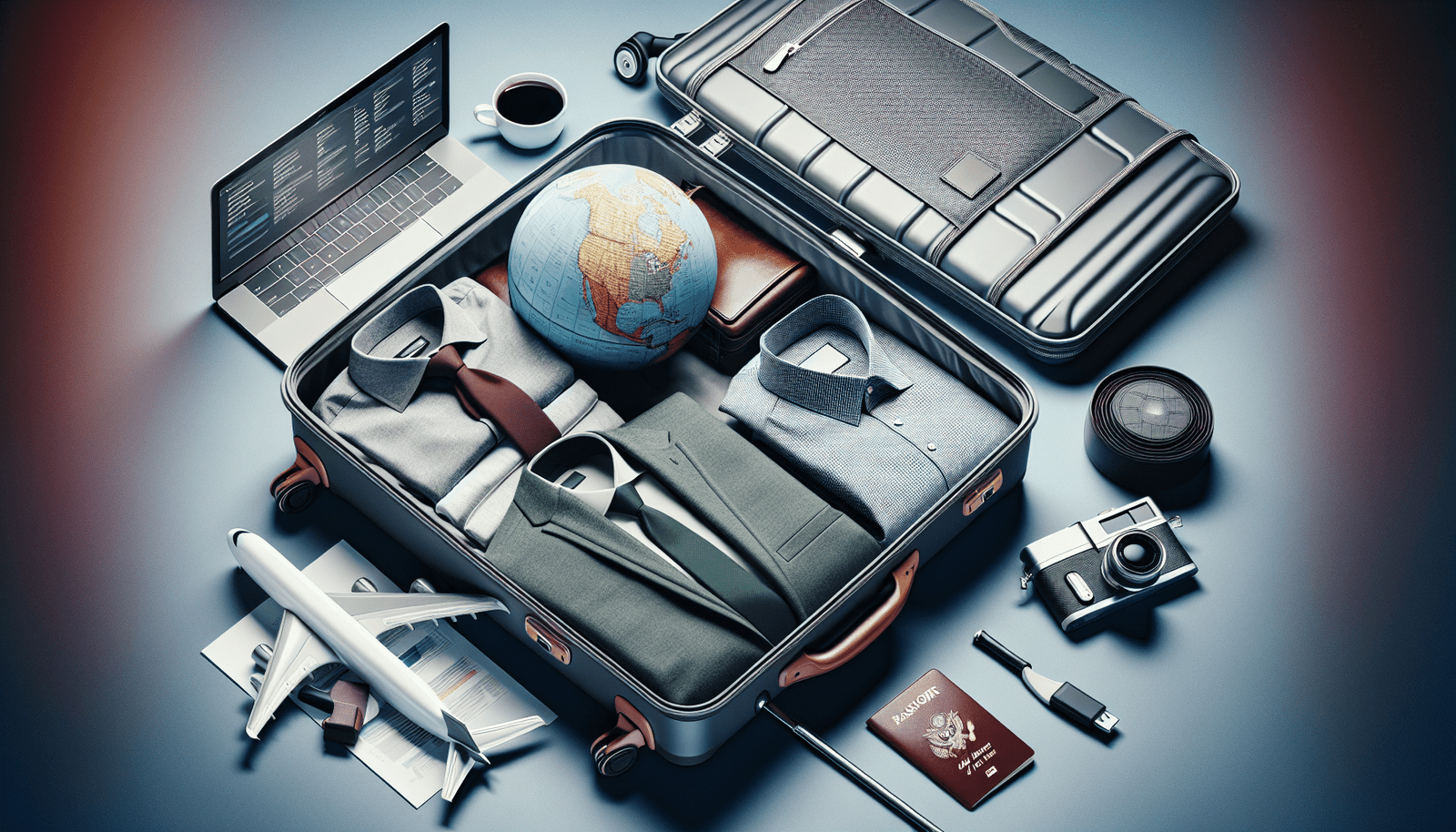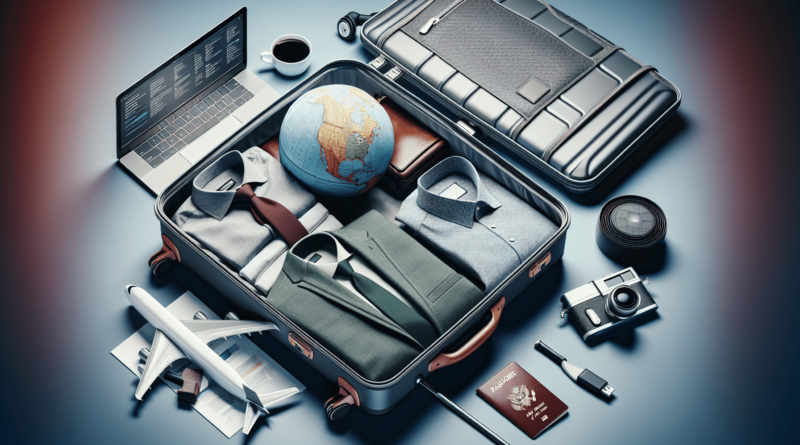Business Travel
You’re about to embark on an incredible journey. The world of business travel isn’t often explored in writing, but today, you’ll get an inside look. This article highlights the essentials of business travel, from packing efficiently and navigating international travel, to managing jet lag, racking up rewards points, and more. Traveling for work might be a necessity in your career, but it does not have to be tedious or tiresome. Read on to discover how you can turn your every trip into a seamless, even enjoyable process by packing seasoned traveler hacks in your carry-on. Let’s commence this interesting trip on ‘Business Travel.’

Understanding Business Travel
Let’s start with the basics.
What is business travel?
In its simplest form, business travel refers to travel undertaken for work or business purposes, as opposed to other types of travel like leisure or tourism. It usually involves traveling from one’s usual work location to a different location to engage in work-related activities. This could include, but is not limited to, attending meetings, conferences, exhibitions, client visits, or company events.
History and evolution of business travel
Scan through the pages of history and you’ll witness a steady evolution of business travel. Technological advancements have primarily steered this change. From horse-drawn carts to railroads, then on to automobiles and now airplanes – the speed and accessibility of business travel have dramatically improved over the centuries. Virtual connectivity, led by the internet and smartphones, has also transformed the way we think about corporate travel. They’ve truly shrunk the world, turning global into the new local.
Types of business travel
Broadly, business travel can be categorized into domestic travel, where you travel within the limits of your own country, and international travel, which implies crossing national borders. But you could also differentiate between individual business travel and group business travel. And let’s not forget – with the advent of the digital era, virtual business travel has also emerged as a distinct category.
Reasons for business travel
There are manifold reasons for business travel. From attending important meetings and negotiating deals to training employees and building client relationships – business travel serves different purposes. In essence, it is essentially about facilitating personal interactions, fostering partnerships, and seizing opportunities. So, dear readers, when the occasion calls, you pack your suitcases and take off!
Planning for Business Travel
By now, we’re sure you’d agree that well-organized travel is a recipe for success.
Creating a business travel plan
Whether you’re a seasoned traveler or a first-timer, a well-crafted business travel plan is key. It outlines the purpose of your travel, the places you will visit, the people you will meet, and the outcomes you expect. Think of it like a roadmap that marks your journey, tickles your memory, and tracks your progress.
Budgeting for business travel
Just like any corporate activity, business travel comes with expenses. And that’s where budgeting comes in. It includes costs for transportation, accommodation, food, and incidentals like phone bills and tips. Keep in mind; every business trip is an investment, with financial implications for the business.
Timing and scheduling
We all know time is a precious commodity. Therefore, planning the timing and scheduling of your trip with precision is inevitable. After all, you wouldn’t want to miss an important meeting because your flight got delayed, would you?
Pre-travel research and preparation
Going well-prepared never goes out of vogue. Research extensively on your destination – its timezone, local customs, dining options, climate, etc. And remember, always stay updated about any travel advisories or safety concerns.
Business Travel Policies
Now, let’s get a little serious and talk about policies.
Importance of a travel policy
Every company should maintain a well-defined business travel policy. It guides employees about acceptable expenses, approval processes, preferred accommodation, and transportation options, among other things. A good policy provides clarity, maintains consistency and ensures cost control.
Elements of a business travel policy
Typically, a business travel policy covers areas such as pre-trip approvals, travel insurance, expense reimbursements, use of company credit cards, etc. However, these elements are not set in stone and should be adjusted according to a company’s unique needs and circumstances.
Implementing and managing travel policies
While developing a business travel policy is essential, its implementation, monitoring, and management are equally critical. This requires open communication, training, and consistent enforcement. Remember, a policy is only as good as its implementation.
Updates and revisions to travel policies
As with anything in a dynamic business environment, travel policies should not be static. Changes in corporate objectives, emerging trends, or employee feedback necessitate regular updates and revisions to the policies.
Business Travel Management
Let’s raise the curtain on the role of those who wear the hat of a travel manager.
Role of a business travel manager
Tasked with overseeing all aspects of business travel, a travel manager is key to an efficient travel program. Their responsibilities range from developing travel policies to negotiating deals with travel vendors to ensuring the safety and well-being of traveling employees.
Strategies for effective business travel management
Some noteworthy strategies for effective business travel management include implementing a comprehensive travel policy, leveraging technology, and employing analytics to understand travel spending patterns. Not to mention, fostering relationships with service providers can also help unlock special deals and discounts.
Evaluating travel performance
A critical aspect of travel management is evaluating the efficiency and effectiveness of travel activities. This includes analyzing travel expenses, assessing employee satisfaction, and measuring the impact of business travel on overall business performance.
Risk management in business travel
Risk management plays a crucial role in business travel. This entails preparing for unforeseen events like health emergencies, natural disasters, or political instability. An effective risk management strategy goes a long way in ensuring the safety of travelers and minimizing disruption to business activities.
Business Travel Technology
As with most industries, technology has its part in reshaping the landscape of business travel.
Role of technology in business travel
From online booking tools and mobile travel apps to virtual meetings and AI-powered chatbots – technology has simplified business travel like never before. It has made booking, tracking, and managing travel activities much more convenient and personalised.
Specific technologies for business travel
Several technologies cater to different facets of business travel. For instance, expense management software allows quick and error-free processing of travel reimbursements. At the same time, GPS technologies provide real-time travel advisories, helping travelers mitigate risks and disruptions.
Advantages of using technology in business travel
The benefits of using technology in business travel are profound. It increases efficiency and convenience, offers personalisation, improves communciation and aids in risk management. Technology is indeed a game-changer in the realm of business travel.
Future technologies in business travel
With advancements in artificial intelligence, virtual reality, and blockchain, the future of business travel is poised to become even more tech-enabled and seamless. Imagine immersive VR-powered meetings or blockchain-enabled secure payments – the future, indeed, looks exciting!
Business Travel and Sustainability
With increasing concern over the environment, sustainability has become an urgent issue in the field of business travel.
Understanding the environmental impact of business travel
Business travel, particularly air travel, can have severe environmental consequences. It contributes to greenhouse gas emissions, leading to climate change. Hence, businesses must be conscious of their travel footprint and endeavor to limit it as much as possible.
Practices for sustainable business travel
Promoting sustainable business travel involves a combination of big and small steps. Companies can opt for greener modes of transport, offset their carbon emissions, and encourage virtual meetings wherever possible. Don’t forget – every initiative counts!
Role of companies in promoting sustainable travel
Companies play a pivotal role in promoting sustainable travel. By integrating sustainability into their travel policies and educating employees about eco-friendly practices, they can make a significant difference.
Future of sustainable business travel
The future trajectory of sustainable business travel promises further progress. Increased use of renewable energy, further enhancements in virtual technology, and growing social consciousness are expected to make business travel greener than ever before.
Diversity and Inclusion in Business Travel
The conversation is incomplete without talking about diversity and inclusion, isn’t it?
Understanding diversity in business travel
In an increasingly globalized world, business travelers come from diverse backgrounds and have distinct needs. Thus, understanding diversity in business travel is critical – be it in terms of gender, race, nationality, age, or dietary preferences.
Inclusion strategies for diverse business travelers
Inclusion should be a prime aspect of any business travel policy. This can be achieved by ensuring equal opportunities for all travelers, accommodating their unique needs, and fostering a respectful and inclusive culture.
Challenges faced by diverse business travelers
Diverse business travelers may face unique challenges related to language barriers, cultural differences, or accessibility needs. Recognizing and addressing these challenges is an integral part of fostering inclusion.
The role of employers in promoting diversity in business travel
Employers play a crucial role in advocating diversity and inclusion in business travel. They can take proactive measures like implementing inclusive travel policies, conducting diversity training, and sensitizing employees to cultural differences.
Mental and Physical Wellness in Business Travel
Never forget, health is wealth – even when you’re on the move!
Importance of wellness in business travel
Business travel can be taxing—both physically and mentally. Constant stress, disrupted routines, and differing time zones can take a toll on one’s health. Hence, prioritizing wellness during business travel is a must.
Strategies for maintaining wellness during business travel
Maintaining wellness during business travel involves conscious efforts like regular exercise, adequate sleep, healthy eating, and mindfulness practices. It’s about finding the right balance in your routine while on the move.
Support from companies for employee wellness during travel
Companies can significantly support employee wellness during travel. This can be done through policies that promote enough rest, provide for healthy meals, and ensure access to wellness facilities.
Challenges and solutions for wellness in business travel
Despite the best efforts, maintaining wellness during long trips can be challenging. These might involve issues like jet lag, unhealthy food options, or unavailability of exercise facilities. However, with thoughtful planning and prioritization, these challenges can be effectively managed.
Culture and Business Travel
Now, let’s immerse ourselves into the world of culture.
Understanding the role of culture in business travel
As you traverse the globe for business, understanding different cultures becomes inevitable. Cultural competence can impact your relationships, negotiations, and overall business success. So, the more culturally aware you are, the better it is!
Preparing for cultural differences during business travel
Preparation is the name of the game. Before you undertake a trip, make a conscious effort to read up about the local culture, customs, and etiquette of your destination. It will help you avoid cultural faux pas and build rapport with local counterparts.
Cultural etiquette and business travel
Each culture has its unique etiquette – from greetings to dining norms to business customs. Understanding and respecting these cultural nuances can distinguish you as a sensitive and globally aware businessperson.
Challenges and solutions in navigating cultural differences in business travel
Cultural misunderstandings can lead to miscommunications and conflicts. However, these challenges can be overcome by education, open-mindedness, and respectful communication. Remember, when you respect someone’s culture, you respect them as individuals.
The Future of Business Travel
Lastly, let’s cast our gaze into the future.
Predicted trends in business travel
The future of business travel is expected to be shaped by trends like increased use of technology, more emphasis on sustainability and wellness, and a greater focus on diversity and inclusion. Business travel will likely become more personalized, integrated, and flexible, enhancing the traveler’s overall experience.
The role of technology in the future of business travel
Technology will continue playing a pivotal role in shaping the future of business travel. Developments in AI, VR, biometric technology, machine learning, and blockchain are all set to revolutionize the way we travel for business.
Potential challenges for future business travel
Despite the promising outlook, challenges lie ahead. These can stem from geopolitical uncertainties, economic fluctuations, and environmental concerns. However, the future is about rising to these challenges and transforming them into opportunities.
Steps for preparing for the future of business travel
To prepare for the future, companies need to stay abreast of emerging trends, invest in future-ready technologies, promote sustainable travel practices, and foster inclusivity. It’s all about adapting, innovating, and evolving in step with the changing world of business travel.
That’s all on the vast and vibrant world of business travel. From understanding its basics to exploring its future, we’ve traversed a wide terrain. Through this journey, we’ve unraveled that business travel is not just about destination and distance, it’s about discovery and development – of businesses, of relationships, and of self.




